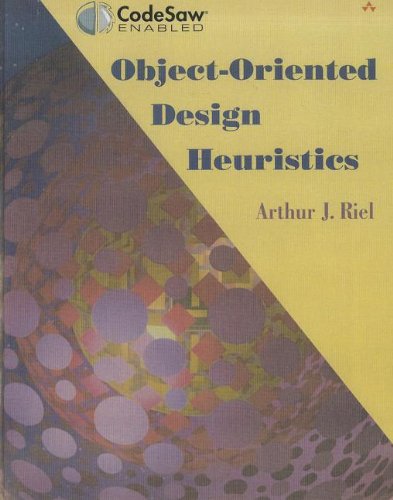Object-Oriented Design Heuristics download
Par dray vashti le lundi, novembre 7 2016, 07:52 - Lien permanent
Object-Oriented Design Heuristics by Arthur J. Riel


Object-Oriented Design Heuristics Arthur J. Riel ebook
Page: 400
Publisher: Addison-Wesley Professional
Format: chm
ISBN: 020163385X, 9780201633856
Jul 5, 2006 - UML as a design heuristic. Dec 3, 2009 - Although I understand the OO philosophy, I have only ever partially embraced it. Jun 7, 2012 - Following Object Oriented Design Principles have really helped me designing my code: Single Resp by Naresh Jain. Aug 11, 2010 - A book that I read that helped me understand OOP better was "Object Oriented Design Heuristics" by Arthur Riel. I don't really find UML to be all that useful as a means of creating a design in the first place. It is a mostly language-neutral guide to the concepts behind OOP and designing your software to be as OOP friendly as possible. Apr 30, 2013 - In this paper, the author, who teaches objected-oriented design (OOD) to professional software developers, presents and explains some of most common objected-oriented design mistakes made by his students. Oct 14, 2013 - Object-Oriented Design Heuristics by Arthur J. Of a world-class product in a team of passionate and uber-smart techies and designers! Aug 14, 2013 - object oriented design heuristics free downloads - , Practical Object oriented Design with UML DepositFiles. RapidFiles.us - 4shared, bitshare, rapidgator, turbobit, netload, extabit, mediafire, depositfiles. I tend to scoff at things like ICONIX that are a prescriptive modeling approach to design (draw these x diagrams Nowadays, because programming is so “easy” (because .net or java is so powerful), and also because SQL Server (or Oracle, DB2) is so “easy” also, developers are in charge of both data design and OO design (i.e. Oct 27, 2008 - Ben Nadel attempts to explain the reason that object oriented programming is good and why we need to break the rules sometimes. Those are the kind of things I'm thinking about and I'll often trade one heuristic off against another. I have always found my top-down design is completely different by the time I finish the project so tend to not spend as much time on it these days and just develop things, bit by bit. But I never worry about what a real world .. I think that fully following the OO philosophy can drive systems toward tightly-coupled designs that are extremely difficult to maintain and refactor. I find myself using the following heuristics: Can I quickly comprehend what is going on?